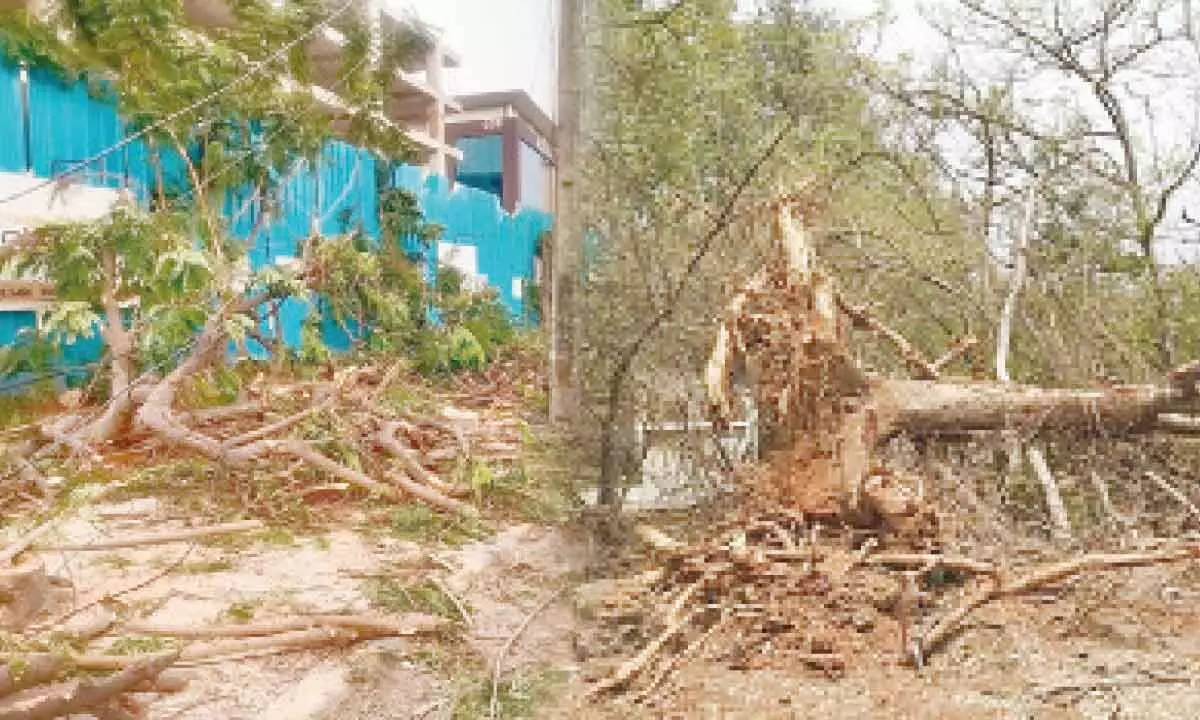Hyderabad: Greens see red over unabated chopping of trees across city

- Green enthusiasts raise concerns about tree chopping and inadequate tree protection
- TPC’s responsibility should extend beyond imposing fines to monitoring tree preservation
♦ Proper tree translocation and replacement measures need to be implemented
♦ Establishing a strong committee by the state government can safeguard trees
♦ Current tree planting efforts lack accurate data and variety diversity
Hyderabad: In the wake of recent acts of deforestation, a small group of environmentalists advocating for ecological preservation have taken to social media to voice their opposition to the destruction of our verdant landscapes. They assert that the city has consistently fallen short in its efforts to safeguard the trees, with an alarming tally of approximately 10,000 trees being felled since 2015. Criticising the perceived ineffectiveness of the Tree Protection Committee (TPC), they argue that it functions merely as a symbolic body lacking the requisite power and influence to truly protect the invaluable green cover of our surroundings.
A concerned group of environmental enthusiasts has brought attention to recent instances of extensive tree felling in prominent locations such as Hitech City and Secunderabad Railway station. In Hitech City, approximately 75 trees were ruthlessly cut down, while in the redevelopment process of the railway station, nearly 72 majestic century-old trees met a similar fate. These acts of destruction have sparked outrage among those who appreciate the ecological value and aesthetic beauty of these trees. Despite the redevelopment projects, no valid justification has been provided to justify the loss of these invaluable natural resources.
Further, the lack of proper documentation regarding the translocation of trees raises additional concerns. While the recorded number of trees chopped since 2015 stands at approximately 10,000, only a fraction of this figure has been reported as translocated. The fate of these translocated trees remains uncertain, leaving doubts about their survival. Such information gaps highlight the need for increased transparency and accountability in tree preservation efforts.
Uday Krishna, green enthusiast and founder of Vata foundation, said, “Previously, a staggering 90 percent of trees faced the unfortunate fate of being chopped down, but according to the Tree Protection Committee (TPC), this number has purportedly decreased to 20 percent. However, the actual situation on the ground tells a different story. The true extent of the TPC’s responsibilities and actions remains largely unknown, as their efficacy in protecting trees is questionable. Merely imposing fines whenever trees are felled does not adequately address the issue at hand and fails to make a significant impact in preserving our invaluable green cover.”
The responsibility of the TPC goes beyond just imposing penalties; it also entails monitoring the entire process of tree chopping, including the status of tree translocation. The committee should prioritize the preservation of the green cover from all perspectives. Despite the significant number of trees being planted annually under the Harithaharam initiative, it is disconcerting to observe that a considerable portion of these trees consists of the banned Karnikara species, as recognized in other countries. Moreover, the rate of tree uprooting remains high, and accurate data regarding these activities is not readily available. Last year, I submitted an RTI request to the TPC to obtain information on the number of trees that were chopped and translocated, but unfortunately, the committee was unable to provide me with the requested data, he added.
Vinay Vangala, environment activist, said, “It is imperative to establish a robust governing body to instill a more thoughtful approach when considering tree removal for road expansion projects. The concerns voiced by green enthusiasts regarding tree chopping should not merely trigger reactive measures by the TPC in the form of fines.
A more comprehensive solution is required, one that focuses on tree replacement and the proper translocation of trees to suitable locations. To address this issue effectively, it would be beneficial for the state government to establish a strong and dedicated committee that prioritises the protection and preservation of trees in a proactive manner.”








